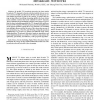Free Online Productivity Tools
i2Speak
i2Symbol
i2OCR
iTex2Img
iWeb2Print
iWeb2Shot
i2Type
iPdf2Split
iPdf2Merge
i2Bopomofo
i2Arabic
i2Style
i2Image
i2PDF
iLatex2Rtf
Sci2ools
TON
2010
2010
On burst transmission scheduling in mobile TV broadcast networks
—In mobile TV broadcast networks, the base station broadcasts TV channels in bursts such that mobile devices can receive a burst of traffic and then turn off their radio frequency circuits till the next burst in order to save energy. To achieve this energy saving without scarifying streaming quality, the base station must carefully construct the burst schedule for all TV channels. This is called the burst scheduling problem. In this paper, we prove that the burst scheduling problem for TV channels with arbitrary bit rates is NP-complete. We then propose a practical simplification of the general problem, which allows TV channels to be classified into multiple classes, and the bit rates of the classes have power of two increments, e.g., 100, 200, and 400 kbps. Using this practical simplification, we propose an optimal and efficient burst scheduling algorithm. We present theoretical analysis, simulation, and actual implementation in a mobile TV testbed to demonstrate the optimality...
Related Content
| Added | 31 Jan 2011 |
| Updated | 31 Jan 2011 |
| Type | Journal |
| Year | 2010 |
| Where | TON |
| Authors | Mohamed Hefeeda, Cheng-Hsin Hsu |
Comments (0)

